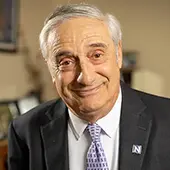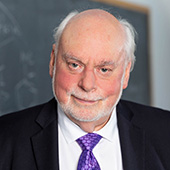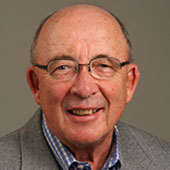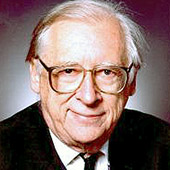Nobel Prize
In 1895, Alfred Nobel signed his last will and testament, giving the largest share of his fortune to a series of prizes in physics, chemistry, physiology or medicine, literature and peace – the Nobel Prizes. In 1968, Sweden’s central bank established The Sveriges Riksbank Prize in Economic Sciences in Memory of Alfred Nobel.
Joel Mokyr (2025)
Weinberg College of Arts and Sciences
Joel Mokyr is the Robert H. Strotz Professor of Arts and Sciences and professor of economics and history in the Weinberg College of Arts and Sciences.
The Royal Swedish Academy of Sciences awarded The Sveriges Riksbank Prize in Economic Sciences in Memory of Alfred Nobel for 2025 to three economists for showing how technological progress has led to sustained economic growth. Mokyr receives half of the prize for his development of a theory for sustained economic growth. Mokyr identified three important requisites for growth: useful knowledge, mechanical competence and institutions conducive to technological progress.
J. Fraser Stoddart (2016)
Weinberg College of Arts and Sciences
Sir Fraser Stoddart is a pioneer in the fields of chemistry and nanoscience. His introduction of the mechanical bond, which has led to the fabrication of artificial molecular switches and motors, has been responsible for putting chemists at the forefront of the burgeoning field of molecular nanotechnology, with implications ranging all the way from information technology to health care.
Stoddart was awarded the 2016 prize in Chemistry with Jean-Pierre Sauvage of
University of Strasbourg, France, and Bernard L. Feringa
of University of Groningen, the Netherlands. They were recognized "for the design and synthesis of molecular machines." Read about his accomplishment.
Dale Mortensen (2010)
Weinberg College of Arts and Sciences
Dale Mortensen was the Board of Trustees Professor of Economics at Northwestern University's Judd A. and Marjorie Weinberg College of Arts and Sciences. He was the recipient of the 2010 Nobel Prize in Economics. He won the prize with Peter Diamond, Massachusetts Institute of Technology, and Christopher Pissarides, London School of Economics and Political Science in the United Kingdom. The prize recognized "their analysis of markets with search frictions."
Dale Mortensen's Nobel Prize medal was donated to Northwestern in 2019.
John Pople (1998)
Weinberg College of Arts and Sciences
British-born John Pople was a pioneer in the theoretical study of the properties of molecules. His research focused on applying the complicated mathematics of quantum mechanics to study the chemical bonding between atoms within molecules. In 1970, the first version of the Pople-designed Gaussian computer program was published. It made his computational techniques easily accessible to chemists in universities and commercial enterprises throughout the world. Pople won the 1998 Nobel Prize in Chemistry, sharing the honor with Walter Kohn of the University of California, Santa Barbara, whose research is similar to Pople's but is more focused on the properties of solid materials, such as metals. Pople was rewarded, in the words of the Nobel Prize Committee, "for developing computational methods making possible the theoretical study of molecules, their properties and how they act together in chemical reactions. These methods are based on the fundamental laws of quantum mechanics."



